Today, we know cities as shared spaces with the potential to both threaten and promote human health: while urban areas are known to amplify the transmission of epidemics like Ebola, urban residency is also associated with longer, healthier lives. Modern cities encompass a wide ecology of infrastructures, institutions and services that impact health, from access to improved sanitation and early childhood education to the design of buildings and transportation systems. So how has this centuries-long transformation in human settlement affected the mindset surrounding public health research and practice?
Urban Public Health is an interdisciplinary collaboration from experts across the globe that approaches the issue of urban health research from a uniquely public health orientation. The carefully crafted and thoughtful chapters in this volume grapple with the complexity of the urban setting as a physical and social space while also providing an abundance of global and local examples of current urban health practices.
Urban Public Health is divided into four pragmatic sections which cover core conceptual models of public health and their inequities, methods of urban health research assessment, methods of urban health research analysis and explanation, and ultimately, opportunities for urban health research to inform action through partnership and collaboration, including those which elevate community voices and capacities. An accessible guide for both students and researchers alike,
Urban Public Health shines a light on how to understand, measure and change the urban setting so that cities grow, people thrive, and no one is left behind.
Dieser Download kann aus rechtlichen Gründen nur mit Rechnungsadresse in A, B, BG, CY, CZ, D, DK, EW, E, FIN, F, GR, HR, H, IRL, I, LT, L, LR, M, NL, PL, P, R, S, SLO, SK ausgeliefert werden.


